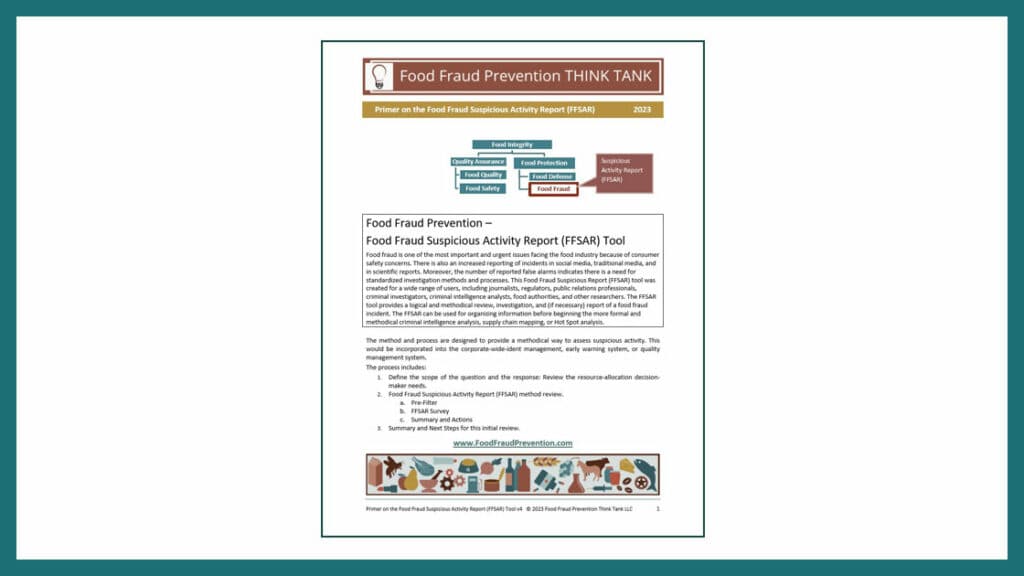Announcing the new Primer document that introduces the Food Fraud Suspicious Activity Report tool (FFSAR). This free and public tool is a standardized way to organize your incident or suspicious activity information. It was developed with INTERPOL/ Europol Operation Opson attendees. Use, apply and share widely.
Direct Link to the Primer: https://foodfraudpreventionthinktank.com/wp-content/uploads/2023/04/FFPTTPrimer-FFSAR-v4.pdf
Direct Link to the Primer Library: https://foodfraudpreventionthinktank.com/primers/
It is great that there is more awareness of food fraud. It is great that there is more reporting of incidents or suspicious activity. But, with all of this new information it is difficult to filter what is an urgent incident, vs. some suspicious activity that should be investigated, vs. a situation that is not actually food fraud.
The Food Fraud Suspicious Activity Report tool (FFSAR) was created during several investigations – and most of those products ended up NOT being food fraud.
The survey was developed and refined with INTERPOL/ Europol Operation OPSON attendees. OPSON is the international coordinated policing activity to study and prevent food fraud. The FFSAR tool has been the subject of several OPSON webinars. The FFSAR training has also been expanded and applied in our Food Fraud Advanced Criminology MOOC.
Case Study Examples
There were several case study examples that identified the need for the FFSAR tool (Spink, 2023 Under Review).
- Chicken Suspected as 50% Soy (Disproved after application of validated test methods): FFSAR would have led the investigator to conduct an appropriate authenticity test method that would have come back ok.
- Dangerous Levels of Arsenic in Apple Juice (Disproved after testing for the correct version of this chemical at the allowable levels): FFSAR would have led the investigator to identify that there are two types of arsenic, and one is not a problem.
- Wood Chips as Filler in Shredded Parmesan Cheese (Disproved and not a violation of law or the product specification): FFSAR would have helped the investigator identify the regulatory requirements and recognize that there are legitimate uses of fillers at even a very high level. To note, it was not ‘wood chips,’ but ‘cellulose,’ and not just cellulose but ‘food ingredient cellulose gum.’
- Dietary Supplements with low/no plant DNA levels (Disproved since the supplements are extracts – not only is low/no DNA not food fraud, but if they had found DNA it would be a quality control problem): FFSAR would have helped the investigator find the certification details and then to select the correct test method.
- 100% labeled Aloe Vera actually only 3% (Disproved since the authenticity tests are conducted on raw not processed aloe vera): FFSAR would have identified the correct authenticity test method, and it is expected that the heated manufacturing process results in approximately 97% DNA denaturation [the DNA breaks down when heated]).
From the Primer:
Food Fraud Prevention – Food Fraud Suspicious Activity Report (FFSAR) Tool
Food fraud is one of the most important and urgent issues facing the food industry because of consumer safety concerns. There is also an increased reporting of incidents in social media, traditional media, and in scientific reports. Moreover, the number of reported false alarms indicates there is a need for standardized investigation methods and processes. This Food Fraud Suspicious Report (FFSAR) tool was created for a wide range of users, including journalists, regulators, public relations professionals, criminal investigators, criminal intelligence analysts, food authorities, and other researchers. The FFSAR tool provides a logical and methodical review, investigation, and (if necessary) report of a food fraud incident. The FFSAR can be used for organizing information before beginning the more formal and methodical criminal intelligence analysis, supply chain mapping, or Hot Spot analysis.
The method and process are designed to provide a methodical way to assess suspicious activity. This would be incorporated into the corporate-wide-ident management, early warning system, or quality management system.
When there is a report of a problem, there are some basic intelligence analysis questions that should be asked before taking any action. At this point, you do not know if it is an incident, a suspicious activity that is a problem, or is activity that is ok but might seem weird to someone.
Table: FFSAR – Suspicious Activity Report – Survey Questions
- Basic Questions
- What is the concern?
- What is the type of information (e.g., lab test, rumor, investigation report, etc.)?
- What is the source of information (e.g., internal company, industry competitor, industry stakeholder, consumer, inspector, investigator, general concern, consumer advocate, etc.)?
- Date (e.g., of the event or incident)?
- Source of Samples (Location, sampling method, sampling plan, and who found the sample)?
- Compliance (What specific law, regulation, certification, standard, or specification has been violated.)?
- Raw materials – are critical raw materials used in the finished product authentic? Critical raw materials would be defined as those raw materials that may significantly affect.
- Supplier Details, Approvals, Audits, or Inspections
- Processing – Would processing alter any of the critical raw materials where when tested for the presence of may not be detectable (e.g., denaturation, masking, etc.)?
- Formulation – Would other raw materials interfere with the critical raw materials where when tested for the presence of may not be detectable?
- Tampering – test sample or retail package: Review for concerns.
- Authenticity Testing: Review results or conduct tests.
Takeaway Points
- It is crucial to receive quick reports of any food fraud incident or suspicious behavior.
- There are many reports that do not include a lot of information and that are not actually incidents.
- Review, share, apply or even require the use of the Food Fraud Suspicious Activity Report (FFSAR) tool to streamline your incident reviews – with this fill-in-the-blanks survey, the food fraud investigators could become more efficient.

